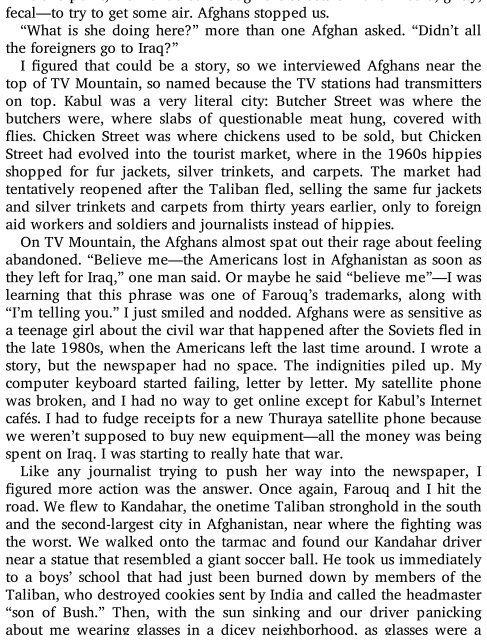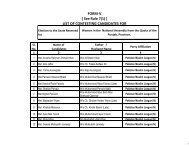- Page 3 and 4: Copyright © 2011 by Kim Barker The
- Page 5 and 6: Cover Title Page Copyright Dedicati
- Page 10 and 11: KABUL
- Page 12 and 13: CHAPTER 1
- Page 14 and 15: enough to make it into my newspaper
- Page 16 and 17: championship game. Like everyone el
- Page 18 and 19: grueling way we came, seven hours,
- Page 22 and 23: clear sign I was a foreigner, we dr
- Page 24 and 25: I CHAPTER 2 MONTANA ew home to Chic
- Page 26 and 27: nancial ruin. I cobbled together re
- Page 28 and 29: city of about three or four million
- Page 30 and 31: one is supposed to be happy at an A
- Page 32 and 33: CHAPTER 3
- Page 34 and 35: can work with someone who says bad
- Page 36 and 37: thrown at their palace compound. I
- Page 38 and 39: confused with the recently opened A
- Page 40 and 41: smiled, even when talking about tra
- Page 42 and 43: convinced Ismail Khan to abandon He
- Page 44 and 45: CHAPTER 4 THERE GOES MY GUN D espit
- Page 46 and 47: U.S. troops were killed in the ghti
- Page 48 and 49: John Wilson. And always, their miss
- Page 50 and 51: I knew this from Afghans—they fea
- Page 52 and 53: A boy poured the sweet milky tea fr
- Page 54 and 55: watch me take notes. In return, I w
- Page 56 and 57: I CHAPTER 5 ONE WAY OR ANOTHER n Ka
- Page 58 and 59: We said goodbye to the taxi driver
- Page 60 and 61: Nasir looked at me, as if I had any
- Page 62 and 63: “They want money,” Farouq told
- Page 64 and 65: CHAPTER 6
- Page 66 and 67: Warlords then took positions outsid
- Page 68 and 69: three pigs were elsewhere at the ti
- Page 70 and 71:
me back and all was forgiven, espec
- Page 72 and 73:
Sean, the British journalist who wa
- Page 74 and 75:
eversed one of its only decisions t
- Page 76 and 77:
I CHAPTER 7 MONKEY GONE TO HEAVEN l
- Page 78 and 79:
oy. But now it was too cold for suc
- Page 80 and 81:
pressure cooker, going from home to
- Page 82 and 83:
Kabul High. One night, as I sat wit
- Page 84 and 85:
force, maybe two to three thousand
- Page 86 and 87:
CHAPTER 8
- Page 88 and 89:
landed rst in Pakistan, then the Un
- Page 90 and 91:
Indian capital’s dingy airport be
- Page 92 and 93:
laid out carpets in the dirt for us
- Page 94 and 95:
simply lming a documentary on the h
- Page 96 and 97:
sleep early. At 3 AM, my phone star
- Page 98 and 99:
CHAPTER 9
- Page 100 and 101:
neighborhood of Shir Pur, where the
- Page 102 and 103:
“Sami thinks he’s got a way to
- Page 104 and 105:
seemed adamant about returning norm
- Page 106 and 107:
for everything. In short, he needed
- Page 108 and 109:
apart, and entire chunks had crumbl
- Page 110 and 111:
years, no one will recognize you li
- Page 112 and 113:
1980s, they had been reluctant to l
- Page 114 and 115:
mysteriously end up dead. We soon d
- Page 116 and 117:
CHAPTER 10 HELL YES S ure, Operatio
- Page 118 and 119:
this to be the best embed possible.
- Page 120 and 121:
out two large guns on the side of t
- Page 122 and 123:
so thin, they had no time to worry
- Page 124 and 125:
screen, we watched the bomb hit, se
- Page 126 and 127:
CHAPTER 11
- Page 128 and 129:
would be the rst to have sex outsid
- Page 130 and 131:
Alaska if you were a woman—the od
- Page 132 and 133:
omber had hit a U.S. military convo
- Page 134 and 135:
I could do, and I had to work. This
- Page 136 and 137:
in Kabul. The Fun House would soon
- Page 138 and 139:
CHAPTER 12 BARELY LEGAL M y eccentr
- Page 140 and 141:
good rule of thumb for most Afghan
- Page 142 and 143:
“He thinks you love him,” she s
- Page 144 and 145:
everyone talked about, the example
- Page 146 and 147:
“My idea is this,” I told the N
- Page 148 and 149:
PART II WHACK- A-STAN
- Page 150 and 151:
CHAPTER 13 UNDER PRESSURE T housand
- Page 152 and 153:
and West Pakistan, nearly a million
- Page 154 and 155:
ght. Throughout the 1980s, the Unit
- Page 156 and 157:
seizing power almost eight years ea
- Page 158 and 159:
moving much at all. The team’s to
- Page 160 and 161:
whenever we hit a town, or even an
- Page 162 and 163:
CHAPTER 14
- Page 164 and 165:
were killed. One head cleric, who h
- Page 166 and 167:
Samad called me “boss.” Often h
- Page 168 and 169:
platform just above the driver, we
- Page 170 and 171:
abbit hole I had fallen, I saw it a
- Page 172 and 173:
CHAPTER 15
- Page 174 and 175:
frantically called people in Pakist
- Page 176 and 177:
lown up near the local ISI office.
- Page 178 and 179:
deep-fried packets, and sweet milky
- Page 180 and 181:
cell phones—but each was close to
- Page 182 and 183:
spontaneous outpouring of grief, no
- Page 184 and 185:
CHAPTER 16
- Page 186 and 187:
power and allowed the plane to land
- Page 188 and 189:
nally told me, referring to Sharif
- Page 190 and 191:
“Yes, Mian Sahib’s schedule is
- Page 192 and 193:
“That was bad planning,” Sharif
- Page 194 and 195:
I snapped a photograph with my Blac
- Page 196 and 197:
CHAPTER 17 LUCKY STAR B uried by th
- Page 198 and 199:
the south weren’t allowed to work
- Page 200 and 201:
audience, who booed Lima. Some of t
- Page 202 and 203:
something. It’s very sensitive.
- Page 204 and 205:
Only then would I learn that everyo
- Page 206 and 207:
CHAPTER 18 SUSPICIOUS MINDS M y new
- Page 208 and 209:
up plates lled with various lukewar
- Page 210 and 211:
“Pull over,” I told Samad. We s
- Page 212 and 213:
kidnapped.” I felt ill. As far as
- Page 214 and 215:
handed me the keys. “We’re hiri
- Page 216 and 217:
CHAPTER 19 REBEL, REBEL S omething
- Page 218 and 219:
“What the hell?” I asked myself
- Page 220 and 221:
a very poor job keeping current pla
- Page 222 and 223:
minutes than we did in six hours.
- Page 224 and 225:
“All my ex-boyfriends? There’s
- Page 226 and 227:
I CHAPTER 20 WHY CAN’T WE BE FRIE
- Page 228 and 229:
President Pervez Musharraf, who had
- Page 230 and 231:
directionless as a headless chicken
- Page 232 and 233:
“Lady, give me your CV. CV,” he
- Page 234 and 235:
I had no idea who sent the message.
- Page 236 and 237:
CHAPTER 21 LONDON CALLING A fter na
- Page 238 and 239:
ad economy, the war, the Pakistani
- Page 240 and 241:
shook Nawaz’s hand—he had soft
- Page 242 and 243:
“BlackBerry, Nokia, or iPhone, Ki
- Page 244 and 245:
CHAPTER 22 DEADBEAT CLUB A s soon a
- Page 246 and 247:
ut it had always been Silver Fox pr
- Page 248 and 249:
probably killers. “Farouq?” I s
- Page 250 and 251:
the deal, reporting that the video
- Page 252 and 253:
CHAPTER 23
- Page 254 and 255:
eturned from Pakistan. He hadn’t
- Page 256 and 257:
against temptation” but with thes
- Page 258 and 259:
“I can’t take it.” “Why not
- Page 260 and 261:
cassettes (DVs). The mayor called u
- Page 262 and 263:
CHAPTER 24
- Page 264 and 265:
Farouq, helping the New York Times
- Page 266 and 267:
world believed the country was abou
- Page 268 and 269:
Why did I want to stay so much, in
- Page 270 and 271:
CHAPTER 25
- Page 272 and 273:
time seeing Afghans as the other. T
- Page 274 and 275:
turn to the right,” the first lie
- Page 276 and 277:
And then, in another nine months, t
- Page 278 and 279:
police riding tractors that ripped
- Page 280 and 281:
I CHAPTER 26 WHEN THE MAN COMES ARO
- Page 282 and 283:
actually might win. For the past tw
- Page 284 and 285:
Farouq had told me how he would pol
- Page 286 and 287:
and without telling my bosses. And
- Page 288 and 289:
CHAPTER 27 HOTEL CALIFORNIA U nempl
- Page 290 and 291:
paying my salary. Many diplomats ra
- Page 292 and 293:
wrappers. After the usual deep-tiss
- Page 294 and 295:
heavy makeup, $70,000 worth of gold
- Page 296 and 297:
to do here. Karzai would eventually
- Page 298 and 299:
the air. For hours we danced, that
- Page 300 and 301:
EPILOGUE
- Page 302 and 303:
Helmand district of Marja ended up
- Page 304 and 305:
Taliban’s clutches in Pakistan.
- Page 306 and 307:
ACKNOWLEDGMENTS
- Page 308 and 309:
my absurd vision. I’m indebted to



